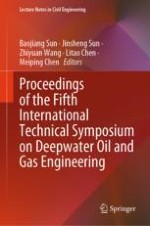2024 | OriginalPaper | Buchkapitel
Experimental Study on the Effect of Water Molecular Clusters on Hydrate Formation
verfasst von : Shangyu Zhang, Shuanshi Fan, Xuemei Lang, Gang Li, Yanhong Wang
Erschienen in: Proceedings of the Fifth International Technical Symposium on Deepwater Oil and Gas Engineering
Verlag: Springer Nature Singapore
Aktivieren Sie unsere intelligente Suche, um passende Fachinhalte oder Patente zu finden.
Wählen Sie Textabschnitte aus um mit Künstlicher Intelligenz passenden Patente zu finden. powered by
Markieren Sie Textabschnitte, um KI-gestützt weitere passende Inhalte zu finden. powered by
